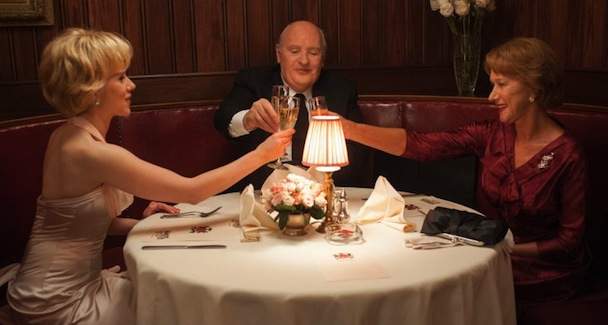Hitchcock
Anthony Hopkins and Helen Mirren impress as Alfred Hitchcock and his filmmaker wife, Alma Reville.
Overview
Biopic Hitchcock joins the legendary director Alfred Hitchcock when he is already well established as the 'Master of Suspense'. It's 1959, though, and that title doesn't yet cover the movie genre we'd perhaps consider most suspenseful horror which is widely thought crass. This is the year he'll start making Psycho.
Hitchcock is a portrait of this changing time, an analysis of why we humans are so interested in horror stories, and a fantasy explaining the romantic relationship between Hitchcock and his wife, screenwriter/editor/assistant director Alma Reville.
It's fair to say the film is pale and uneven at times, but it also does a number of things well. Foremost are the formidable performances of Anthony Hopkins as 'Hitch' and Helen Mirren as Alma. Hopkins is transformed into a man both rotund and orotund. His idiosyncratic sway of speaking is completely charming.
Mirren, meanwhile, has our favour the moment she walks into any film these days, which suits perfectly here, because Hitch's wife has to put up with a lot of ego, and as a woman in the 1950s, her own professional work is routinely disregarded. A lot of Hitchcock is about Alma accepting her place in the world, and the world around her reciprocating with some recognition in return.
Like the Margaret Thatcher biopic The Iron Lady, Hitchcock uses the interesting technique of externalising its subject's thought processes through their interaction with another person, one of their own fantasy like an imaginary friend. Hitch has many conversations with Ed Gein, the serial killer whose case inspired the book Psycho. In this way, the film is able to explore how physical anxieties are linked to emotional anxieties, which is really what is exorcised when we watch a horror movie.
For some people, this 'imaginary friend' technique is a debasement too far in a study of a real person's life, but, as a clearly fictionalised element of the story, I think it can be both legitimate and useful. Hitchcock uses it far better than The Iron Lady, although after a while, the hallucinations become more tiring than illuminating.
One of the real successes of Hitchcock, though, may be that it avoids hagiography. In it, Hitchock is just another mortal among mortals, who with drive, vision, good fortune, and the input of other talented individuals makes truly great films. It's a good, meaty alternative for anyone tired of watching historical figures turned into saints on screen.





